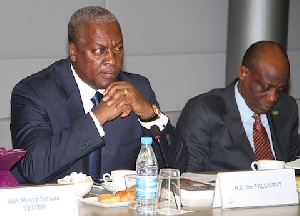Members of the Council of State recently met President John Dramani Mahama at the Peduase Lodge at Aburi to discuss ways of reviving the country’s ailing economy.
The Council of State, led by Cecilia Johnson, urged President Mahama to tackle the country’s current economic challenges.
Mrs Johnson told the President to take ‘bold and decisive’ actions that would help fast-track efforts at improving the Ghanaian economy.
“Four months into the current year, our observations point to a clear resolve on the part of government to bite the bullet in order to put the country on a sound footing,” she said.
They expressed confidence that Ghana’s current economic challenges could be addressed.
She disclosed this shortly before they met the President behind closed doors.
They also learnt about major Government policies.
some economic records
The April 2014 Bank of Ghana Monetary Policy Committee report revealed that total expenditures of Government, including payments for the clearance of arrears and outstanding commitments, amounted to GH¢28.6 billion, lower than the budget target of GH¢30.5 billion.
It also said the wage bill for 2013 amounted to GH¢8.1 billion against a budget target of GH¢7.5 billion, almost 64 percent of tax revenues, which is the highest in the West African sub-region.
Similarly, interest payments recorded GH¢4.4 billion as against a target of GH¢3.2 billion.
The afore-mentioned developments resulted in an overall budget deficit of GH¢9.5 billion (10.8% of GDP) for the year, compared to the budget target of GH¢8 billion (9 percent of GDP).
The deficit was financed mainly from domestic sources, resulting in a Net
Domestic Financing (NDF) of GH¢6.9 billion, higher than the budget target of GH¢5.7 billion while the foreign financing of the budget amounted to GH¢3.2 billion, higher than the GH¢2.5 billion target.
Inflation
Inflation has already hit 14.5 percent in March, this year, as against an inflation target of 9.5 percent for this year, and it is expected to increase further in the ensuing months.
The prime rate now stands at 18 percent.
The situation of the Ghana cedi
It would be recalled that on February 5, this year, the Bank of Ghana announced measures to help halt the free fall of the Cedi.
The Central Bank also directed that all transactions in the country should be conducted in Ghana cedis in compliance with Bank of Ghana Notice dated October 10, 2012 thus revising rules governing the operations of Foreign Exchange Accounts (FEA) and Foreign Currency Accounts (FCA) with effect from February 5, 2014.
It also directed authorized dealers not to sell foreign exchange for the credit of FEA or FCA of their customers, stating that cash withdrawals over the counter from FEA and FCA shall only be permitted for travel purposes outside Ghana and shall not exceed US$10,000.00 or its equivalent in convertible foreign currency per person, per travel.
Additionally, it noted that no bank shall grant a foreign currency denominated loan or foreign currency linked facility to a customer who is not a foreign exchange earner.
It asked all exporters to collect and repatriate in full the proceeds of their exports to their local banks within 60 days of shipment.
In spite of these directives, the cedi continues to depreciate and is now buying at GH¢2.8327 and selling at GH¢2.8353.
Business News of Monday, 12 May 2014
Source: Daily Guide













